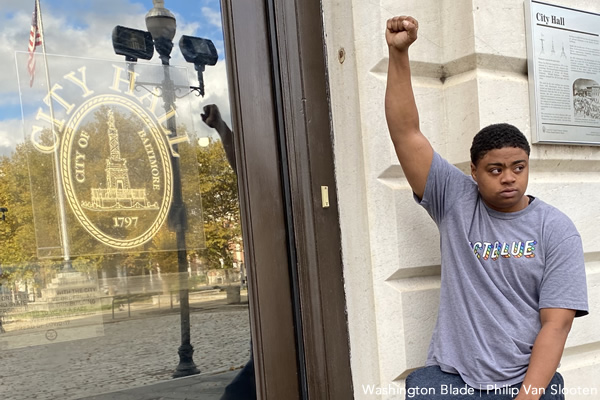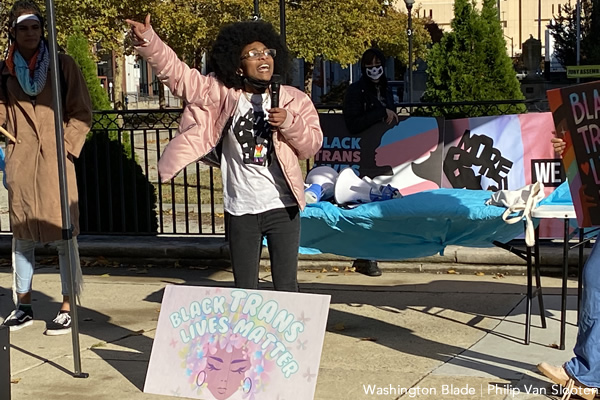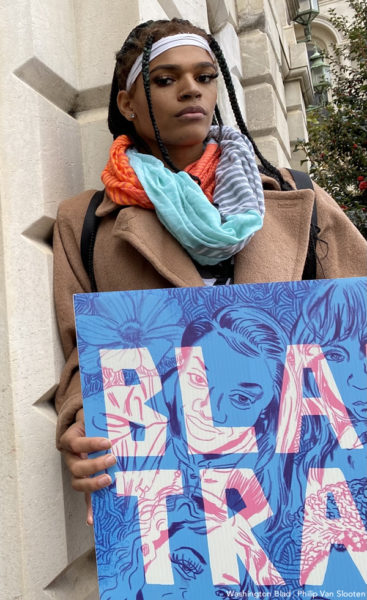Local
Black transgender youth protest treatment at Baltimore jail
BMORE BLXCK hosted Saturday rally

Maryland LGBTQ rights groups, most of them led by Black transgender youth, rallied in front of Baltimore City Hall on Saturday to protest trans inmates’ complaints of harassment and violence at a state-run correctional facility in Baltimore.
BMORE BLXCK, a Black LGBTQ organization, hosted the event, which was co-organized by FreeState Justice and supported by members of Baltimore Safe Haven. The groups rallied in response to trans detainees’ complaints about harassment and unsafe housing assignments in the Baltimore Central Booking and Intake Center.
“We are here today because we need Baltimore officials to listen to us and hear the fact that we’re dying,” said BMORE BLXCK Co-founder and Executive Director Legacy Forte, who identifies as Black trans woman.

Activists at Saturday’s rally also chanted the name of Kim Wirtz, a 43-year-old trans woman who died after being found unconscious in the Baltimore facility in February.
The Human Rights Campaign says 2021 has been the deadliest year for the trans community since it began tracking in 2013. The National Center for Transgender Equality also found prisons are particularly dangerous for trans women, who often aren’t housed according to their gender identity.
“When a trans individual is detained, they need to be put into the facility that they identify as,” Forte said. “If a trans woman is incarcerated, she needs to be placed into the woman’s facility for her safety.”
Maryland Department of Public Safety and Correctional Services spokesperson Mark Vernarelli told the Baltimore Sun in October after Kazzy Davis, an 18-year-old trans person, complained about the Baltimore intake facility, that the agency “takes very seriously the preservation of each detainee and inmate’s dignity” and safety. Former inmates with recent experiences at the facility, however, told the Washington Blade that serious problems persist.
Nicole Wells, a trans woman who identifies as both white and Latina, is a case manager with Baltimore Safe Haven.
She described the harassment and misgendering she faced while held at the facility. Despite having an identification with her current name and gender marker, Wells was housed in a male unit, an experience that she still finds traumatic.
“It was terrible,” Wells said. “The staff misgendered me and placed me with the males. They did not put me in protective custody and I was assaulted by one of the inmates.”
Others spoke of similar experiences, including Devine Bey, a Black trans woman who was housed in the male unit, and Josiah Damore, a Black trans man who was housed in the women’s unit. Both reported that staff misgendered them, as well as difficulties receiving their hormone treatments and other forms of abuse.

The Blade reached out to the Maryland Department of Public Safety and Correctional Services for comment, but did not receive a response prior to publication.
It’s Medical Evaluations Manual states correctional facilities will provide medical services, including hormones, for trans detainees. The manual details the medical intake process itself, which includes a review of documents as well as a physical examination of the inmate.
The manual also notes trans women being at “greater risk of sexual violence by other male inmates if they are not placed in protective custody,” but surgical transitioning is used as a basis for gender-affirming housing assignments.
“Incomplete surgical gender reassignment require that the patient be classified according to his or her birth sex for purposes of prison housing, regardless of how long they have lived their life as a member of the opposite gender,” the medical intake policy states.
“These patients are usually offered protective custody,” it adds, but former inmates who spoke with the Blade said this is not always the case despite their safety concerns.
Unfortunately, these incidents in Baltimore are not isolated.
The 2015 U.S. Transgender Survey found trans people were 10 times as likely to be sexually assaulted by their fellow inmates and five times as likely to be sexually assaulted by staff compared to other inmates. Trans prisoners also reported other challenges including denial of medical care and lengthy stays in solitary confinement.
National Center for Transgender Equality Executive Director Rodrigo Heng-Lehtinen told the Blade that U.S. correctional facilities are dangerous for anyone but being trans makes individuals “particularly vulnerable to attack.”
“Just like with policing, the jail and prison system needs sweeping reforms before trans people can be safe,” Heng-Lehtinen said. “At a minimum they need to be housed how they identify. Often they are placed in a facility based on a strip search in a disrespectful attempt to determine gender and place the person in a facility based on anatomical judgements.”
FreeState Justice Executive Director Jeremy LaMaster told the Blade his organization became involved with complaints surrounding the Baltimore booking center after Baltimore Safe Haven came to them with concerns about the facility.
He said FreeState Justice is looking into the complaints, but is also working with legislators to address a much needed policy update.
“We’re looking into adding a reporting requirement and a timeline for reporting incidents, so families are aware of what is going on,” he said. “We’re also looking at the creation of some type of liaison position or community advisory board to ensure there is conversation about the unique needs of people who are trans or in the LGBTQ community while incarcerated.”
State Sen. Clarence Lam (D-Baltimore County), who chairs the Maryland Senate’s Joint Committee on Fair Practices and State Personnel Oversight, told the Blade he was not aware of issues at the state-run facility, but felt there should be “proper oversight and safeguards in place to make sure the safety and rights of all individuals at the facility are protected and appropriate procedures are followed.”
He added the Maryland Division of Corrections first needs an opportunity to address the issue and ensure they are properly following the policies they have in place for trans detainees before the state gets involved.
Sgt. Kevin Bailey, the LGBTQ Liaison for the Baltimore Police Department, said although he couldn’t speak about how a state-run facility, which is managed separate from the city, operates, he did say there are benefits to having help from the community navigate these stressful interactions.
Speaking from his experience in the Baltimore Police Department, he said community and bias training can help each side understand the history and biases underlying and straining interactions.
“So, as a police department we deal with legal documents,” he explained. “So sometimes having an interaction with a person who is transgender, their legal documents may not line up with who they are as a person. Understanding that helps officers understand the person they are dealing with is not being deceitful. When they give you their name, use that name, and understand their struggle.”
He said while police officers still have to use a person’s legal name in the report, they can use the name the person gives them verbally when interacting with them. This can help the officer understand the community better and deescalate a situation.
While he felt the same training could be useful in correctional facilities, or in any organization that interacts with the LGBTQ community, Heng-Lehtinen pointed out this has to be the first step, not the last.
“The best policy would be for when someone is being booked,” he said. “And that policy should not be an assignment based on genitalia, it should be based on where the person would be the most safe.”
Maryland
Md. Commission on LGBTQIA+ Affairs released updated student recommendations
LGBTQ students report higher rates of bullying, suicide

The Maryland Commission on LGBTQIA+ Affairs has released updated recommendations on how the state’s schools can support LGBTQ students.
The updated 16-page document outlines eight “actionable recommendations” for Maryland schools, supplemented with data and links to additional resources. The recommendations are:
- Developing and passing a uniform statewide and comprehensive policy aimed at protecting “transgender, nonbinary, and gender expansive students” against discrimination. The recommendation lists minimum requirements for the policy to address: name, pronoun usage, and restroom access.
- Requiring all educators to receive training about the specific needs of LGBTQ students, by trained facilitators. The training’s “core competencies” include instruction on terminology, data, and support for students.
- Implementing LGBTQ-inclusive curricula and preventing book bans. The report highlights a “comprehensive sexual education curriculum” as specifically important in the overall education curriculum. It also states the curriculum will “provide all students with life-saving information about how to protect themselves and others in sexual and romantic situations.”
- Establishing Gender Sexuality Alliances “at all schools and in all grade levels.” This recommendation includes measures on how to adequately establish effective GSAs, such as campaign advertising, and official state resources that outline how to establish and maintain a GSA.
- Providing resources to students’ family members and supporters. This recommendation proposes partnering with local education agencies to provide “culturally responsive, LGBTQIA+ affirming family engagement initiatives.”
- Collecting statewide data on LGBTQ youth. The data on Maryland’s LGBTQ youth population is sparse and non-exhaustive, and this recommendation seeks to collect information to inform policy and programming across the state for LGBTQ youth.
- Hiring a full-time team at the Maryland Department of Education that focuses on LGBTQ student achievement. These employees would have specific duties that include “advising on local and state, and federal policy” as well as developing the LGBTQ curriculum, and organizing the data and family resources.
- Promoting and ensuring awareness of the 2024 guidelines to support LGBTQ students.
The commission has 21 members, with elections every year, and open volunteer positions. It was created in 2021 and amended in 2023 to add more members.
The Governor’s Office of Communication says the commission’s goal is “to serve LGBTQIA+ Marylanders by galvanizing community voices, researching and addressing challenges, and advocating for policies to advance equity and inclusion.”
The commission is tasked with coming up with yearly recommendations. This year’s aim “to ensure that every child can learn in a safe, inclusive, and supportive environment.”
The Human Rights Campaign’s most recent report on LGBTQ youth revealed that 46.1 percent of LGBTQ youth felt unsafe in some school settings. Those numbers are higher for transgender students, with 54.9 percent of them saying they feel unsafe in school.
Maryland’s High School Youth Risk Behavior Survey reveals a disparity in mental health issues and concerns among students who identify as LGBTQ, compared to those who are heterosexual. LGBTQ students report higher rates of bullying, feelings of hopelessness, and suicidal thoughts. Nearly 36 percent of LGBTQ students report they have a suicide plan, and 26.7 percent of respondents say they have attempted to die by suicide.
The commission’s recommendations seek to combat the mental health crisis among the state’s LGBTQ students. They are also a call for local and state governments to work towards implementing them.
Virginia
Va. lawmakers consider partial restoration of Ryan White funds
State Department of Health in 2025 cut $20 million from Part B program

The Virginia General Assembly is considering the partial restoration of HIV funding that the state’s Department of Health cut last year.
The Department of Health in 2025 cut $20 million — or 67 percent of total funding — from the Ryan White Part B program.
The funding cuts started with the Trump-Vance administration passing budget cuts to federal HIV screening and protection programs. Rebate issues between the Virginia Department of Health and the company that provides HIV medications began.
Advocates say the funding cuts have disproportionately impacted lower-income people.
The Ryan White HIV/AIDS Program, a federal program started in 1990, provides medical services, public education, and essential services. Part B offers 21 services, seven of which remained funded after the budget cuts.
Equality Virginia notes “in 2025, a 67 percent reduction severely destabilized HIV services across the commonwealth.”
Virginia lawmakers have approved two bills — House Bill 30 and Senate Bill 30 — that would partially restore the funding. The Ryan White cuts remain a concern among community members.
Both chambers of the General Assembly must review their proposed changes before lawmakers can adopt the bills.
“While these amendments aren’t a full restoration of what community-based organizations lost, this marks a critical step toward stabilizing care for thousands of Virginians living with HIV,” said Equality Virginia Executive Director Narissa Rahaman. “Equality Virginia plans to continue their contact with lawmakers and delegates through the conference and up until the passing of the budget.”
“We appreciate lawmakers from both sides of the aisle who recognized the urgency of this moment and will work to ensure funding remains in the final version signed by the governor,” added Rahaman.
District of Columbia
D.C. Black Pride theme, performers announced at ‘Speakeasy’
Durand Bernarr to headline 2026 programming

The Center for Black Equity held its 2026 DC Black Pride Theme Reveal event at Union Stage on Monday. The evening, a “Speakeasy Happy Hour,” was hosted by Anthony Oakes and featured performances by Lolita Leopard and Keith Angelo. The Center for Black Equity organizes DC Black Pride.
Kenya Hutton, Center for Black Equity president and CEO, spoke following the performances by Leopard and Angelo. Hutton announced this year’s theme for DC Black Pride: “New Black Renaissance.”
Performers for 2026 DC Black Pride were announced to be Bang Garcon, Be Steadwell, Jay Columbus, Bennu Byrd, Rue Pratt and Akeem Woods.
Singer-songwriter Durand Bernarr was announced as the headliner for the 2026 festivities. Bernerr gave brief remarks through a video played on the screen at the stage.
DC Black Pride is scheduled for May 22-25. For more information on DC Black Pride, visit dcblackpride.org.



















